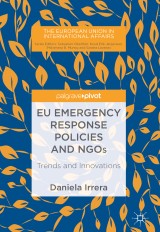Details

EU Emergency Response Policies and NGOs
Trends and InnovationsThe European Union in International Affairs
|
58,84 € |
|
| Verlag: | Palgrave Macmillan |
| Format: | |
| Veröffentl.: | 07.12.2017 |
| ISBN/EAN: | 9783319697277 |
| Sprache: | englisch |
Dieses eBook enthält ein Wasserzeichen.
Beschreibungen
<p>This book analyses trends and changes in the European Union’s (EU) humanitarian aid policy, by focusing on the performance of Non-governmental Organisations (NGOs). NGOs have developed strong relationships with international institutions but have also maintained direct interaction with EU member states. The result is a multi-layered process in which national interests, common values, universal principles and global duties meet and interact. By combining a deepening of the theoretical debate with the use of empirical data on the funding of NGO projects by EU institutions and member states, the book significantly furthers our understanding of the complex relationship between these actors. It will appeal to students and scholars interested in EU politics, global security, and international aid, as well as practitioners in the humanitarian field. </p><p></p>
<p>Chapter 1. Introduction - EU emergency response policies and NGOs: why it matters.- Chapter 2. The humanitarian system, the EU and NGOs: the state of the art.- Chapter 3. The EU emergency response and NGOs: a theoretical overview.- Chapter. 4 NGOs, ECHO, and Member States: an empirical analysis.- Chapter 5. Conclusions - The EU humanitarian aid policy in the age of change.</p> <p> </p>
<p>Daniela Irrera is Associate Professor of International Relations and Global Civil Society at the Department of Political and Social Sciences, University of Catania, Italy. She currently serves as President of the European Peace Research Association. A visiting scholar in several universities in Europe, USA, Asia and Canada, she has researched and published on the impact of non-state actors on global politics.</p><p><b></b></p>
<p>This book analyses trends and changes in the European Union’s (EU) humanitarian aid policy, by focusing on the performance of Non-governmental Organisations (NGOs). NGOs have developed strong relationships with international institutions but have also maintained direct interaction with EU member states. The result is a multi-layered process in which national interests, common values, universal principles and global duties meet and interact. By combining a deepening of the theoretical debate with the use of empirical data on the funding of NGO projects by EU institutions and member states, the book significantly furthers our understanding of the complex relationship between these actors. It will appeal to students and scholars interested in EU politics, global security, and international aid, as well as practitioners in the humanitarian field. </p>
Assesses the impact of NGOs on the EU humanitarian aid policy Combines IR theory with empirical data Offers concrete insights leading to policy recommendations
Assesses the impact of NGOs on the EU humanitarian aid policy<div>Combines IR theories with literature on the roles of NGOs in the humanitarian system</div><div>Offers a set of concrete insights to shape future research trends and be used as policy recommendations<br/><br/></div>
“This book is a timely and important discussion on the future of EU humanitarian aid policy. It manages to contribute to a wider theoretical debate by using rich empirical data on the funding of NGOs projects through EU institutions and member states. The book will be of interest beyond the specialised community.” (Florian Trauner, Vrije Universiteit Brussel, Belgium) <p>“In this timely book, Daniela Irrera sheds light on the connection between NGOs and humanitarian strategies, right when the global environment seems threatened by risks which traditional state policy cannot fully cope with. The book is required reading for anybody who wants to understand EU external relations and helps to appreciate the true impact of Europe in the world, going beyond the simple account of formal institutions.” (Filippo Andreatta, University of Bologna, Italy)</p>

















